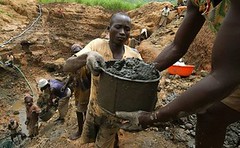
Mineral extraction is a lucrative business in the Democratic Republic of Congo. Western multi-national firms are dependent upon these resources in order to make profit within the world capitalist market. The country marked its 50th anniversary June 30.
Originally uploaded by Pan-African News Wire File Photos
Fri Jul 16, 1:15 PM
WASHINGTON (AFP) - The US Congress has taken steps to curb commerce in "conflict minerals" that enrich armed groups in Democratic Republic of Congo, notably in the country's strife-torn eastern region.
Tucked away in a bill to rewrite the rules on Wall Street, which
President Barack Obama is set to sign next week, are provisions to cut
into illicit trade in four minerals often used in consumer electronics
like mobile telephones.
"The people of the Congo have for far too long been pawns in a bloody
struggle between armed groups, who fuel their violent campaigns of
terror with proceeds from illicit mining," Democratic Representative
Howard Berman, chairman of the House Foreign Affairs Committee, said Thursday.
The legislation requires companies that do business in Congo and
neighboring countries to tell US regulators where they obtained
columbite-tantalite (coltan), cassiterite (tin ore), gold, and
wolframite.
The measure also requires those firms to conduct regular audits to
ensure that they are not contributing directly or indirectly to the
bloody armed conflict in the region.
And the bill calls on the US State Department to submit a revised and
improved strategy for dealing with the illicit minerals trade as well
as a map showing the linkages between the minerals and armed groups.
International smelting firms purchase raw materials used in mobile
phones from Congolese trading houses which source them in areas
controlled by forces such as the Rwandan rebel Democratic Front for
the Liberation of Rwanda and the DR Congolese regular army, according to the Global Witness watchdog group.
Warring parties in eastern Congo control much of the trade in valuable
metals such as tin, tantalum and tungsten, as well as gold, according
to Global Witness and UN rapporteurs.
Berman, key author of the new rules, called the bill "a critical first
step in ending this threat to the stability of central Africa and a
victory in the battle to combat injustice in one of the poorest
countries in the world."
Unlike diamonds, the minerals cannot easily be chemically tested to
learn their point of origin, complicating efforts to curb the illicit
trade.
Some electronics firms have told US lawmakers that the audits required under the bill will cost about one penny per product, according to a congressional aide.
No comments:
Post a Comment